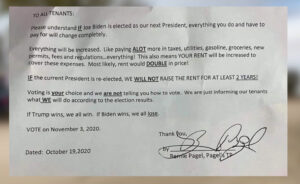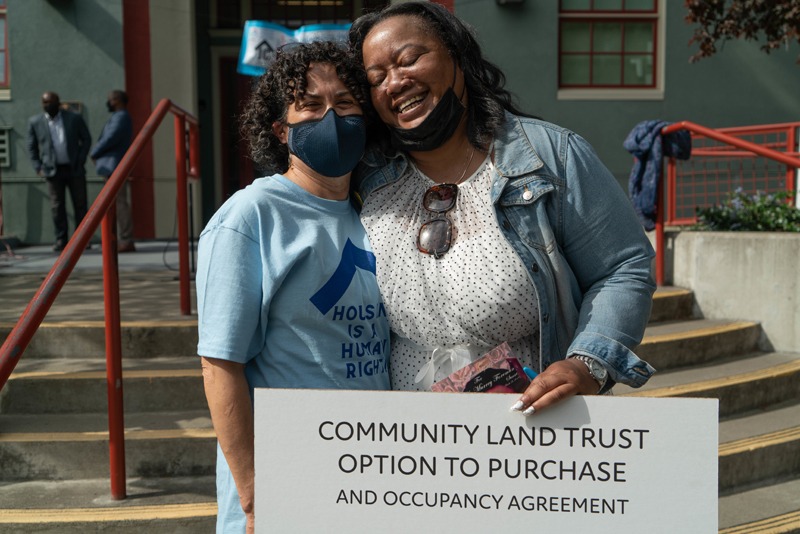
June 12, 2017; Curbed New York
Tenancy at will is the property owner’s “state of nature.” Back in the Middle Ages, the landlord was literally the lord of the land. Landed nobility were the owners, employers, and civil magistrates. Today’s landlord, schooled by the libertarian, free market philosophies of Adam Smith, John Locke, and Ayn Rand, uses the mantra, “If you don’t like it, move.” Landlord harassment is today’s way of making tenants dislike staying enough that they decide to move.
The website Curbed offers a story entitled “New York’s 10 worst landlords targeted by housing advocates” to expose the predatory practices that are designed to force out rent stabilized tenants so that the investors can bring in tenants who are willing and able to pay a higher rent.
Techniques like making illegal rent increases, threats to call immigration or children’s services, seizing tenants’ belongings, adding fees for basic services in lieu of rent increases, and carrying out phony, sloppy, annoying, dangerous construction are all part of the harassment toolkit. While the ten worst landlords story focuses on the most egregious violators, the use of harassment techniques to force out rent-stabilized tenants is widespread, especially in communities undergoing rapid increase in property values due to gentrification.
Where tenants have acquired, usually by political action, some tenure rights, it is harder for landlords to exercise absolute authority. In New York City, for instance, where there are some restrictions on rent and some legal protections in court, tenants are less likely to be evicted cheaply and efficiently in order to make room for other (more lucrative) customers. Just last week, the New York Supreme Court upheld an initiative by Governor Cuomo that protects “rent-regulated tenants from overcharges, harassment and intimidation by unscrupulous landlords.” Governor Cuomo called the decision a victory for the more than 2 million rent-regulated tenants in the state.
Sign up for our free newsletters
Subscribe to NPQ's newsletters to have our top stories delivered directly to your inbox.
By signing up, you agree to our privacy policy and terms of use, and to receive messages from NPQ and our partners.
Landlord harassment is not just a NYC problem. Passive aggressive disregard of tenant complaints may have been a factor in the Grenfell Towers tragedy. Feargus O’Sullivan writes in CityLab,
Redeveloping or remodeling public projects also means that boroughs and developers can squeeze out extra revenue by adding homes for the private market—“affordable” homes that, while cheaper than market rates, still generate some income. In order to maximize these profits, there’s pressure to remove as many poorer public housing tenants as possible, to make more room for market-rate apartments. Homes that previously had public tenants in them are left unfilled, while public tenants can be offered a flat fee to clear out and never return (in some cases without fully understanding that the money offered bars their right to return.)
Back in the U.S., private owners of federally subsidized properties already use non-legal harassment to remove undesirable tenants who are protected by the “just cause” provisions in the HUD lease. This month, tenants in a small senior property in Ohio were denied additional handicapped parking spaces and told by management’s attorney that they were free to break their leases to move to a property with more handicapped spaces. After a meeting with the out-of-town owners of the property, tenants were surprised to find personal financial documents affixed to their unit doors, open for all to see. These tactics were initiated after tenants requested a meeting with the out-of-town owners to discuss handicapped spaces, slow response to a plumbing crisis over the Easter weekend, and verbal harassment by the on-site property manager.
If the U.S. Congress adopts President Trump’s budget proposals, which would raise rents for subsidized tenants, more harassment may be on the way. There could be an incentive to rent to higher-income households by forcing out the oldest, most disabled, and least-self-sufficient tenants to make room. Tenants currently protected by “just cause” provisions in the HUD model lease could be harassed into moving “voluntarily.”
Where tenants have strong social networks, family members and social service providers can sometimes offset harassment. Just being present in the building during working hours can be a deterrent to abusive behavior. Accompanying a tenant to meetings to be a witness/advocate can help. Sometimes, however, low-level social service providers are themselves harassed by property managers when they try to be advocates. It is not unusual for property managers to complain to social agency employers when home service workers speak up for their clients.—Spencer Wells













